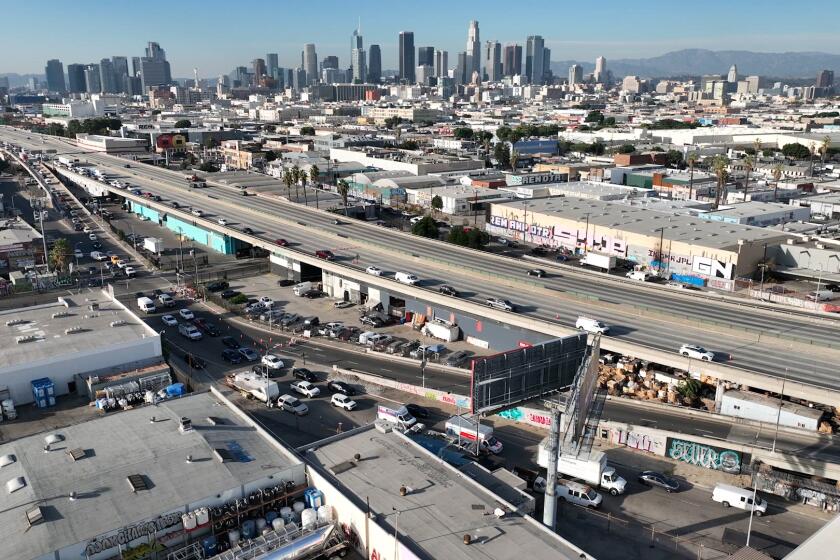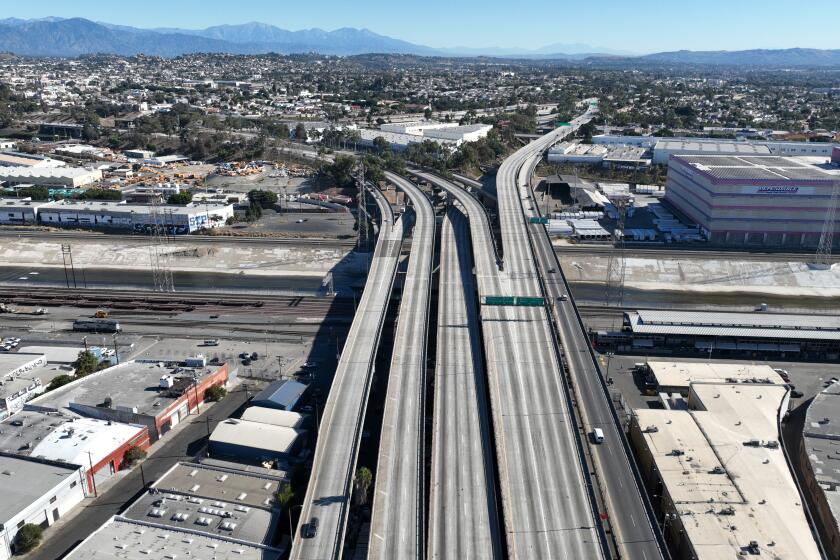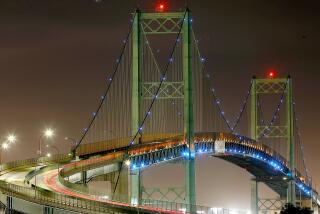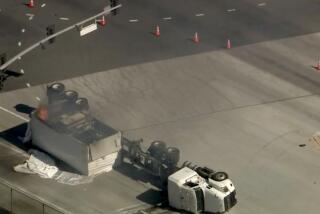L.A. traffic since 10 Freeway closed is ‘manageable’ with pockets of ‘absolute parking lot’
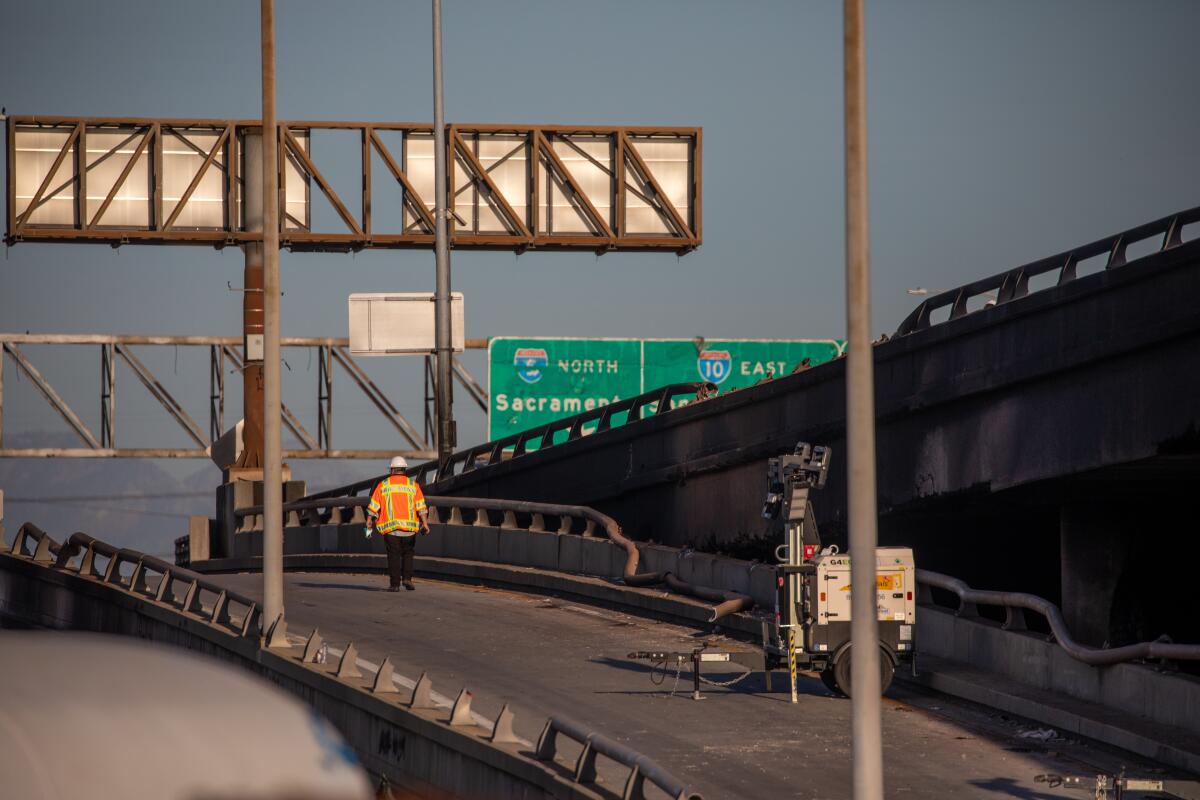
Despite fears of a carmageddon, the closure of a major Los Angeles freeway has so far not resulted in the traffic apocalypse some feared.
On Monday, the first weekday commuters got on the road since the 10 Freeway was closed through downtown L.A. due to a massive fire, traffic engineers got their first glimpse of the challenges city officials and drivers will be facing until the section of the freeway is reopened.
The signs, city officials said, were both encouraging and a reminder of the challenges to come.
Gov. Gavin Newsom said the freeway could be closed for several weeks as repairs are made, so Los Angeles will have to get used to living without the stretch of freeway.
A section of the 10 Freeway in downtown Los Angeles that was damaged by a massive fire over the weekend will not need to be demolished, but repairs will take three to five weeks, officials said.
“The morning commute, while congested, did not result in gridlocked streets,” said Laura Rubio-Cornejo, general manager of the Los Angeles Department of Transportation during a morning news conference Tuesday.
The lack of congestion seemed to suggest that residents had heeded the numerous cellphone alerts, social media posts and messages from city officials asking them to avoid the area and find other ways of getting to their destinations.
Although the evening commute did get a “higher degree” of congestion in the streets being used to reroute traffic away from the 10, Rubio-Cornejo said traffic engineers were able to adjust traffic light patterns on surface streets to mitigate the impact.
Overall, officials said, the downtown streets being used for detours saw a 14.7% increase in traffic throughout the day.
That seemed to be a “manageable” increase, Rubio-Cornejo said, but she warned that even slight increases in traffic on downtown streets could have a larger impact, not just on the detour routes, but connected streets and communities as well.
“It is important to remember that these are typically some of the most utilized and congested streets under normal circumstances,” she said. “For every percentage increase, the effect is even greater and congestion spreads wider.”
The increased impact was evident Tuesday evening, according to Mayor Karen Bass, who recounted at an evening news conference the helicopter tour she took of the affected area late in the afternoon.
“The surface streets looked like an absolute parking lot,” Bass said.
A crucial stretch of the 10 Freeway remains closed through downtown L.A. after a major fire damaged the highway. Here is what we know.
Officials on Monday continued to urge residents to avoid the area by using public transportation, working from home where possible or carpooling if they commute near the area.
“You should expect traffic and plan accordingly,” Rubio-Cornejo said.
Bass echoed the sentiment on Tuesday.
“The other thing that was crystal clear, is that if you are on Metro, you do not have to worry about this at all,” Bass said, referencing the surface-street gridlock.
To assist efforts, a spokesperson with the city’s Transportation Department said the Commuter Express bus service will be free beginning Monday. The buses head directly to points downtown from areas such as the northeast San Fernando Valley, Thousand Oaks, South Bay, Long Beach, and other areas.
Newsom said no demolition would be required before repairs began on one of the country’s busiest freeway corridors,
“This is not a demo operation. This is a repair operation,” Gov. Gavin Newsom said Tuesday morning at the site of the fire, which started under the overpass at Alameda Street early Saturday.
Core samples taken from the freeway columns and bridge deck showed that damage from the pallet-fueled fire was not as extensive as it could have been in a worst-case scenario. Repairs will take three to five weeks, and traffic lanes could be partially reopened during construction, Newsom said.
“I want to see something much faster,” Newsom added. “And I have all the confidence in the world of men and women you see behind me and the pace of their repairs already underway.”
California Department of Transportation engineers met with senior management Monday to provide an assessment of the damage and possible timelines for getting traffic moving again on the mile-long section of the 10 between Alameda Street and the East L.A interchange.
“The results were very good,” said the engineer, who described two scenarios contingent on the damaged freeway being shored up and supported from underneath.
In the worst case, the shoring will be removed in stages — one direction, then another — so lanes can be replaced and portions of the road can be kept open to traffic. In the best-case scenario, the shoring will stay in place, allowing repairs to be made without closing lanes.
Staff writer Jeremy Childs contributed to this report.
More to Read
Sign up for Essential California
The most important California stories and recommendations in your inbox every morning.
You may occasionally receive promotional content from the Los Angeles Times.
